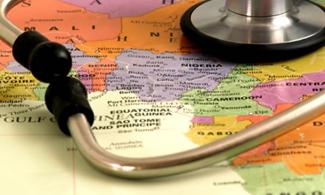
If during times when global oil prices were attractive with oil selling for over $100 per barrel, Nigeria’s health sector was still generally challenged with poor budgetary provisions and funding for health with a progressive reduction of the percentage allocations to health in the yearly budgets of the various levels of government, one wonders what will happen in 2015 with the sharp fall in global oil prices.
The fall in oil prices in the global market, which emerged in 2014, and the introduction of some austerity measures by the Nigerian government may adversely affect funding, financial allocations, and releases to Nigeria’s health sector, particularly if the health sector in this crucial MDG target year is not given topmost priority by the various levels of government.
If during times when global oil prices were attractive with oil selling for over $100 per barrel, Nigeria’s health sector was still generally challenged with poor budgetary provisions and funding for health with a progressive reduction of the percentage allocations to health in the yearly budgets of the various levels of government, one wonders what will happen in 2015 with the sharp fall in global oil prices. Indeed, aside from only very few state governments in Nigeria, most governments at federal, state and local levels are often in gross breach of the 2001 Abuja declaration of African Heads of State which prescribed that a minimum of 15% of government’s budget should be allocated to the health sector. Also, the percentage allocations to the health sector in the 2015 and 2014 Federal budgets were not inspiring as they were less than the percentage allocated to the health sector in the 2013 budget.
The foregoing situation is what informs my current fears for the health of Nigerians in 2015.

I fear that if the economic challenges are not well managed and the expected funding difficulties in the health sector in 2015 are not mitigated by the various levels of government and health authorities, it may adversely affect the productivity of the work force and further worsen the economic state of Nigeria, particularly due to loss of man hours from ill-health on account of a greater number of Nigerians likely to either indulge in catastrophic health expenditures in 2015 or patronize quacks with the attendant complications to their health and well-being.
Similarly, one will not be surprised to see a slowing down of various national, state, local and institutional health programs and services, with consequent negative impact on the quality of health care services, patient care and the health of Nigerians. This is more so as most public health institutions and agencies in Nigeria are already groaning under the pains of reduced revenues and subventions in the outgone year, 2014.
I therefore wish to call on all levels of government to institute more imaginative strategies in their management of the current economic crisis resulting from the global fall in oil prices in a way that takes into account the need to substantially insulate the health sector, preserve and protect the health of the people, and encourage greater investments in the health sector.
This is the time for all levels of government to grant tax reliefs and import duty waivers to providers of healthcare and hospital equipment, as well as institute the promised Health and Hospital Development Fund (HHDIF).
Federal, state and local government authorities should not be deterred from devoting adequate resources to health as well as ensuring allocative efficiency, inspite of the global oil crisis and some other competing demands of government. This is in realisation of the strong nexus between quality healthcare and economic development.
They must remain guided by the fact that investments in the health of the people are needed to reverse brain drain, improve Nigeria’s health indices and engender substantial economic and social returns for the country through a productive economy driven by healthy citizens of Nigeria.
The year 2015 is undoubtedly a crucial year for the Nigerian health sector and the health of Nigerians. If governments at federal, state and local levels do not explore imaginative approaches in managing the ripple effects of the global oil crisis, I am doubtful if Nigeria can successfully breast the tape in the race to the attainment of the Millennium Development Goals (MDGs).
Dr. Osahon Enabulele, M.B; B.S, FWACP, MHPM
Vice President (WAR), Commonwealth Medical Association;
Immediate Past President, Nigerian Medical Association